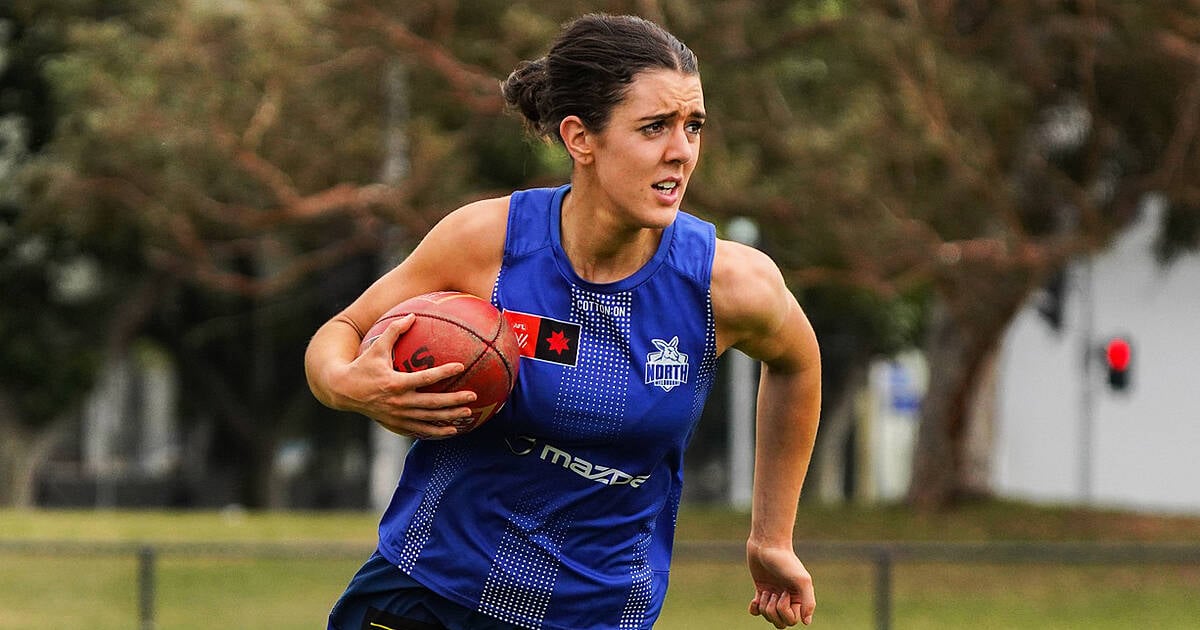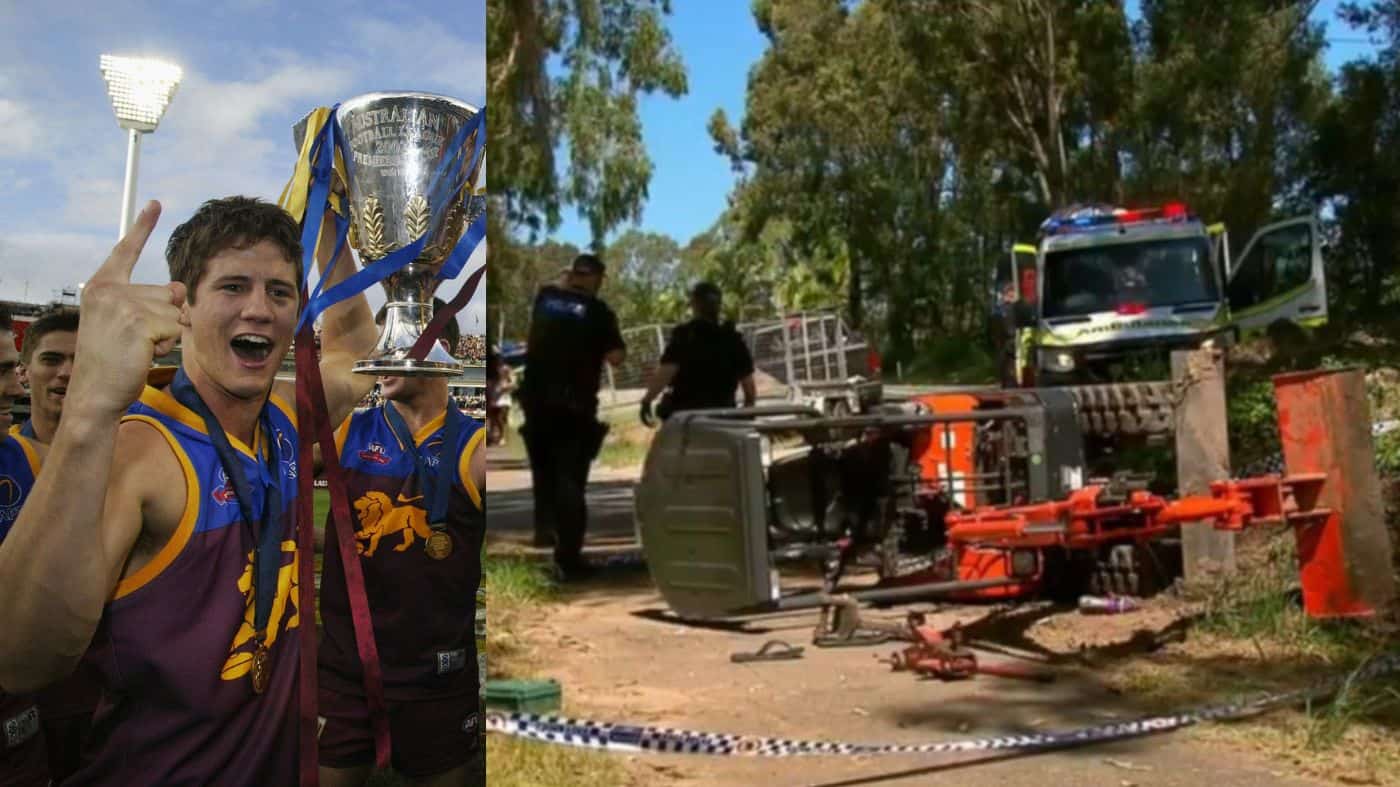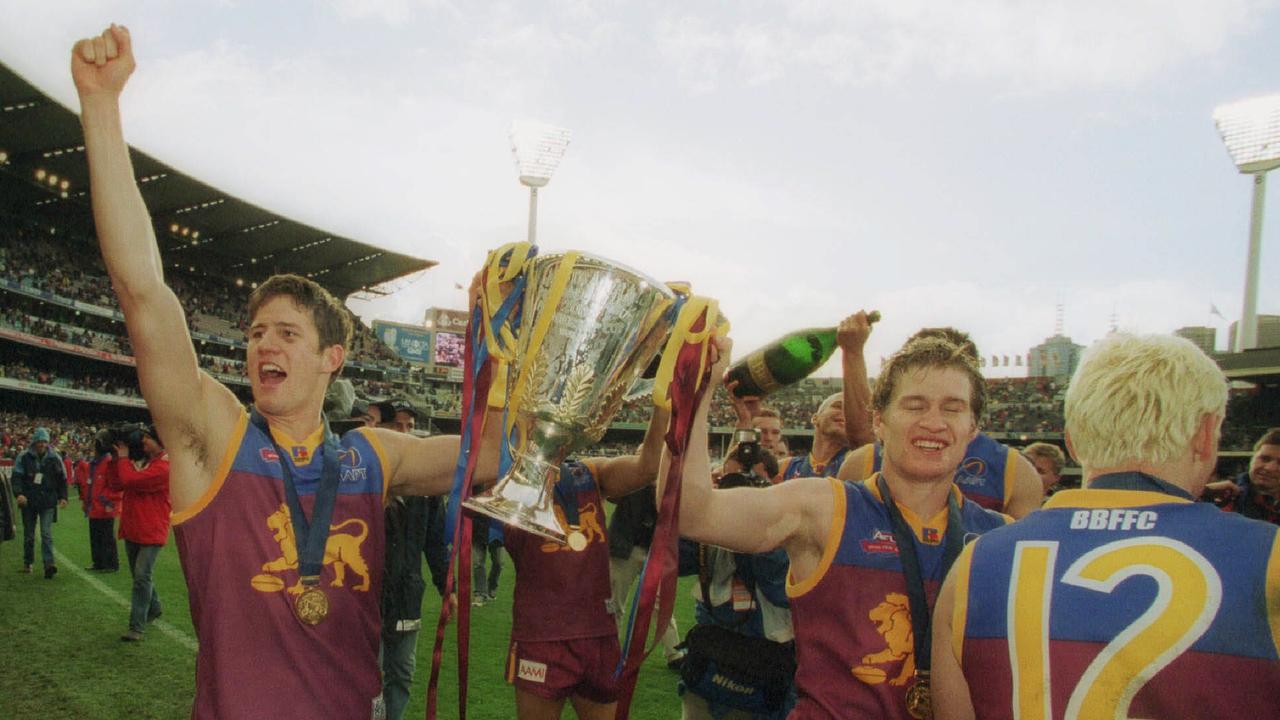‘Dagger in the heart’: What it’s like to be told you won’t receive another AFL contract

- by Admin
- October 15, 2024
Just weeks after finding out he wouldn’t be offered another contract by GWS, Cooper Hamilton found himself in a waiting room for a second surgery on the foot injury that plagued, and was ultimately the downfall of, his AFL career.
“I remember pointing to the form. It said occupation and I looked and I was like, ‘f—, what do I write here?’,” Hamilton said.
“Do I write unemployed? Do I write student or AFL player? I actually didn’t know what to write.”
He was in an unfamiliar spot of not-knowing what was next.
Within a fortnight of graduating high school, Hamilton had been picked up by the Giants in the 2021 rookie draft.
Cooper Hamilton receives his Giants gurnsey from teammate Harry Perryman ahead of his debut game in round seven, 2022. (Getty Images: Sarah Reed/AFL Photos)
While his peers were determining the next stage of their lives — university, jobs, whether to take a gap year or what degree to study — everything was basically laid out for him to fulfil his childhood dream.
“I had a structure, I had a routine. I was moving to Sydney. I knew what I was doing day-to-day, and then even when I was away from the club, on a Christmas break or something, I knew exactly what I was doing each day,” Hamilton said.
“It was very structured and you follow the structure to a tee. And then my first year flew by. I loved it. It was great … we underperformed as a club, but I was just loving being in Sydney and sort of experiencing the whole being an AFL player.”
A stress injury of the navicular bone then sidelined him for the majority of his second and third years, which led him to not being offered a contract beyond 2024.
In fact, he wasn’t sure he would get one for the 2024 season. He had to wait to the end of that year’s trade period to sign his new one-year deal.
After the anxiety of that experience and the mental toll it took, he asked GWS football manager Jason McCartney in round 22 this year for a coffee.
“We had a great chat and he said, ‘yeah, look, we’re not in a position to offer a contract’, and I’d sort of already prepared myself for that,” Hamilton said.
“I understood that I hadn’t really been able to show myself on field, and they didn’t have a spot for me.”
The now 21-year-old said it was a weird position to be in, albeit a common one for most AFL players. You go from getting paid a good amount of money to play the game you love, to then having it “ripped away from you” and needing to find out what to do next.
“It almost feels if the rug’s pulled out from underneath you, or a bit of a safety net removed from you, and you’re just free falling and you’ve got to figure out how to pull the pin on the parachute as quickly as you can,” Hamilton said.
“You sort of go, ‘shit, now I have to enter the real world’. The last couple of weeks have been, especially since the AFL finished, since after the grand final, it’s been really tough, sort of trying to get the terms of that and realising that you really have got to actively look at life after football.”
‘If you’re not at your best, you don’t get another gig’
120 men’s and 91 women’s players were delisted at the end of 2023. While most big name AFL players make it to 150 games and beyond, the average career length for an AFL player is just five years.
It’s a position inaugural premiership player Sarah Perkins has found herself in twice, first delisted from the Adelaide Crows in 2019, then from Hawthorn in 2023.
The now 31-year-old said afterwards it was both a heartbreaking and daunting position to be in.
“Because you’re in this nice little bubble, and then you’re, all of a sudden, you’re out of it … both times I’ve kind of been stuck with, like, ‘holy shit, what’s next?’,” Perkins said.
Sarah Perkins faced being delisted in the AFLW, which was a double blow given her involvement in community programs at her clubs. (AAP: Dan Peled)
“Potentially for some boys, if they’ve been in the system a really long time, and they haven’t set themselves up for outside, or they’re a young boy who gets delisted in their second or third season, that would be something that they would really find hard, because you kind of put all your eggs in one basket, right?
“You’re like, ‘oh, I can make a career of this’, or ‘this is the area that I want to work in’. But when it’s all gone, you’re kind of like, ‘holy shit, what now?'”
This was especially the case when she left the Crows, as like a lot of AFLW players, she had a supplementary job at the club in the community space, meaning she went from having two jobs, to suddenly none.
Then while at the Hawks, she tragically had some close family members pass away back-to-back. She said there “wasn’t really that chance to sort of grieve the loss as well as trying to be an elite athlete”, which made the pressure to perform hard.
“[It’s] just unfortunate, the way that life works. If you’re not at your best, you don’t get another gig,” Perkins said.
It’s why so many past players stick around clubs in some capacity, or go into AFL media roles: “They’ll grab any opportunity and give a crack. Because I think for a lot of us, you want to stay involved in the sport.”
Richmond champions Jack Riewoldt and Trent Cotchin retired together in 2023, and both have since moved into media roles. (Getty Images: Michael Willson/AFL Photos)
Research conducted by the AFL Players’ Association found that 70 per cent of delisted players had higher levels of career self-doubt compared to retired players, who finished their AFL careers with greater financial capability.
Moreover, the lack of autonomy players experienced during their careers promoted an unpreparedness for life outside, the AFLPA’s Insights and Impact Report (2023) found.
It’s a big area of concern for the union, who cite player transition as a significant challenge, particularly in prioritising well-being of former players.
“The AFLPA works with clubs to offer a number of programs and services that assist players’ career exploration outside of football,” Ben Smith, AFLPA general manager of member programs and services, said.
“Our research tells us that this exploration is vital to build vocational confidence and broaden the players’ thinking about their next career when the time for transition comes.
“Transition is more than an event – it begins the minute players walk through their clubs’ doors and continues long after they’ve left the system.”
To help, all past players have a player retirement account, which has more than $205 million invested on behalf of members, and hands out payments in the financial year following their exit from the system for up to 10 years (dependent upon tenure).
There are several programs and services also available to past players, including in wellbeing, finance and career transition.
‘A lot I wanted to give’
Unlike Hamilton and Perkins, former Melbourne midfielder Jordie McKenzie has the gift of hindsight when reflecting on the exit meeting that took away the thing he wanted to do most.
McKenzie, now 34, played 79 games for the Demons between 2009 and 2015 and was a mainstay for a few of those middle years, including winning the coach’s award in 2010.
He said the first 18 years of his life were all about doing everything he could to become an AFL player. Then once he got there, it was all about trying to squeeze the lemon as hard as he could to get the most out of his ability.
Jordie McKenzie played 79 games for the Demons and followed the path many other AFL players face of being delisted by the club. (Getty Images: Robert Prezioso)
“It’s all consuming, but all consuming for me in a good way,” McKenzie said.
“You’re still a kid at 18 … so, it definitely does somewhat form part of your identity, of who you are but in reality, in the big picture, it’s only going to be a small little part of your life, but an enormous one at that time, that’s for sure.”
McKenzie now works in finance, and being in Melbourne, is still around plenty of people who want to talk AFL at the water cooler. There are not a lot of people who are lucky enough to play AFL, McKenzie said, so the privilege of being able to do so isn’t lost on him.
“When you do get those words, [that] you’re not getting another contact and you’re getting delisted, it does make it really hard. [The] last seven years is a long time. It’s probably all you know for that sort of period,” McKenzie said.
“And it’s something you love doing. So to get that taken away from you, even though that is the reality of the industry and the profession, it definitely does make it really tough.
“As much as much as it was a dagger in the heart, I was able to move on because I wasn’t blindsided by it, and I still had a lot I wanted to give, you know, in the world in general … from outside of footy with study and work but also I was excited about still playing footy at a state league level, and seeing how much I could continue to get out of myself from a football perspective.”
Cooper Hamilton is documenting his life after footy via social media.
(Getty Images: WIll Russell/AFL Photos)
As for Cooper, he’s documenting his newly unemployed, post-AFL life via his social media.
He wants to show that, despite what fans might think when players are in the system, they do go through an identity crisis like the majority of us.
“A large majority of them don’t know what they’re doing next, and it’s a very daunting experience,” he said.
“And I just want to sort of relay that it’s relatable to, especially people my age, who are coming out of uni and don’t really know what they want to do. We’re not superhuman at all, especially someone who has been in the system for three years, so it’s very relatable.”
And if nothing else, it’ll keep him busy for a while.
The Latest News
-
December 24, 2024Letters reveal The Don’s struggles with fame, eye for talent and fears for cricket’s future
-
December 24, 2024Head has short net session, in doubt for Boxing Day Test
-
December 24, 2024How Travis Head decluttered and became the best batter in the world
-
December 23, 2024‘Puts golf on the map here’: Ryan Fox praises Rory McIlroy visiting New Zealand’s Tara Iti, Te Arai – Australian Golf Digest
-
December 23, 2024Freedom Boat Club Announces its 10th Australian Location with its Newest Location Offering Direct Access to the Iconic Brisbane River – Marine Business News




